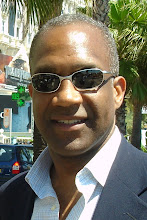 The brush fires in California, and the accompanying reports of homeowners who refuse to evacuate at the risk of perishing in the flames and smoke, are an apt metaphor of Christian discipleship's simple requirement: Living with an open hand.
The brush fires in California, and the accompanying reports of homeowners who refuse to evacuate at the risk of perishing in the flames and smoke, are an apt metaphor of Christian discipleship's simple requirement: Living with an open hand.In Luke's Gospel, Jesus is recorded, after a brief discourse, as saying: "So then, none of you can be My disciple who does not give up all his own possessions." (Luke 14: 33, NASB)
The early 20th Century Christian missionary Oswald Chambers opined that this didn't mean that one could not be saved, as if from the peril of hell (which complements our original metaphor), but that he or she would not completely belong to Jesus. (Please click here for the referenced quotation.)
The point is that it is impossible to completely belong to Jesus if one is holding any of his own possessions. Discipleship, you see, is a zero-sum game. John the Baptist understood it as such: "He (Jesus) must increase, but I (John) must decrease." (John 3: 30, NASB, parenthetical notes are mine)
Holding one's own possessions is not the same as being a caretaker (steward) for the possessions of someone else. In life, we will have things, but the aspiring disciple of Jesus regards all that is under his or her stewardship as such, and not a personal possession.
One of the best illustrations of this occurred to a disciple named Clarence Jordan, who in 1942 began an experiment in racial reconciliation on a farm near Americus, Georgia, which drew the ire of some of its white neighbors. In the mid-1950s, Jordan's "experiment," Koinonia Farms, was the a frequent target of gunfire, bombings, arson, and the beating of its people.
In a letter to a friend, written in 1959, Jordan wrote: "I remember the night Harry Atkinson and I were on our way over to the roadside market after we had received word that it had been bombed and was burning. When we came over a hill we could see the fiery glow on the horizon, and this ignited a burning in my heart. I was scorched with anger, and I'm sure if I had known who had committed the act, there would have been considerable hatred in my heart. At that time I doubt that I could have distinguished between anger and hate.
"But as I had occasion to think, I realized that the hate was rooted in a consuming possessiveness. . . Later I had the same reaction when various ones, including myself and my children, were shot at. The so-and-sos were trying to take our lives from us!
"The solution to this soul-destroying condition came only upon the recognition that neither property nor lives were ours but God's. They never really had been ours in any sense of the word. We hadn't even 'given them back to Him' -- they were His all along. And if this was he way He wanted to spend His property and His people in order to accomplish His purposes, why should we pitch a tantrum?" ("Theology in Coveralls," Sojourners magazine, December 1979)
As Jordan notes, our possessiveness provokes all manner of negative emotions within us, and will eventually destroy the core of our being -- our soul.
I have always been in awe of people who live life with an open hand. Those rare folk who will work hard for something, but will also walk away from it or give it up because, I think, they have realized as John the Baptist did in Jesus' time; and Clarence Jordan has in ours, that it all belongs to God and it is God's to use (however peculiar or wasteful it may, at the time, seem to us) for His purposes.
Too many of us, for far too long have lived our life with a clenched hand. We grip what we have grasped. We are loathe to let go; and heaven help anyone who dare take what we hold from us. Yet, the truth of the matter is this: While no one may not be able to take what you have, neither can someone give you something better.
To give away all that one possesses is the first step toward gaining the gifts of God!




No comments:
Post a Comment